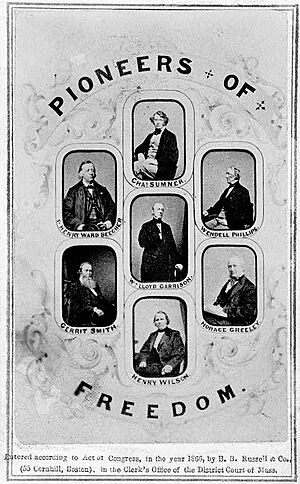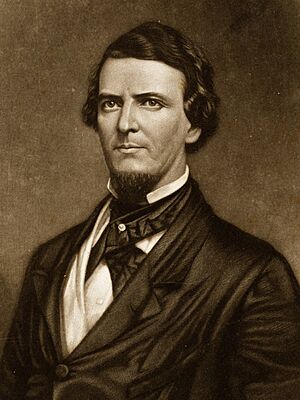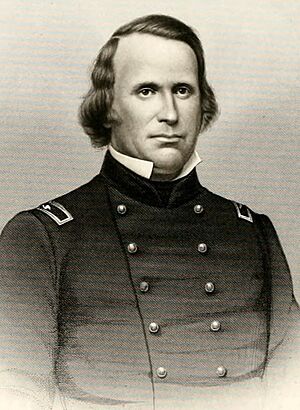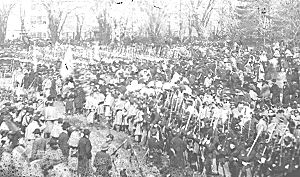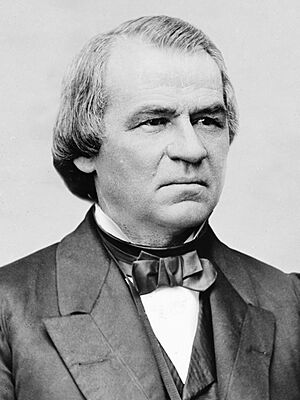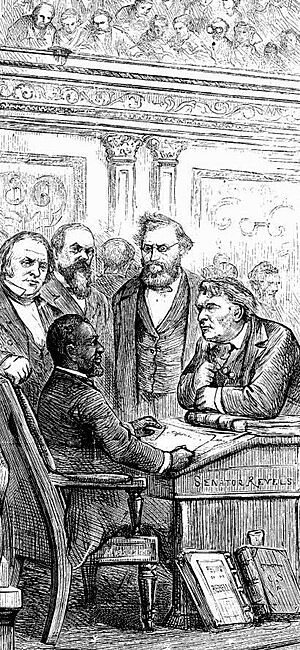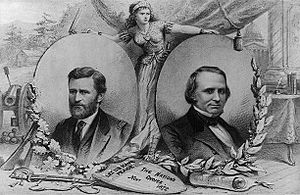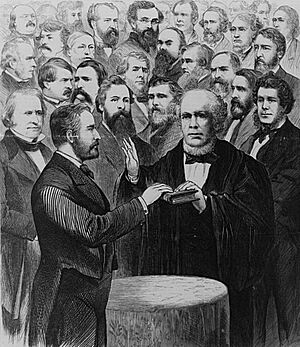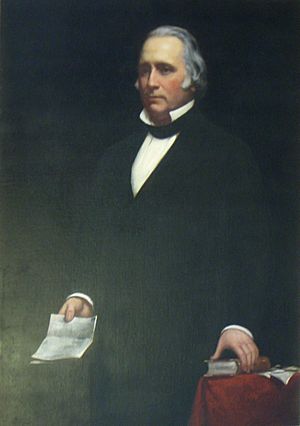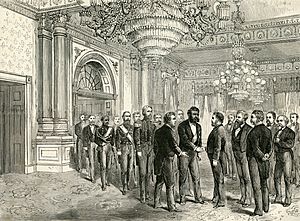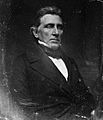Henry Wilson facts for kids
Quick facts for kids
Henry Wilson
|
|
|---|---|
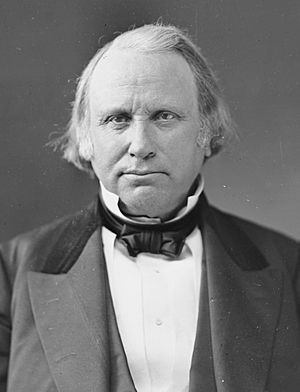
Wilson in 1873
|
|
| 18th Vice President of the United States | |
| In office March 4, 1873 – November 22, 1875 |
|
| President | Ulysses S. Grant |
| Preceded by | Schuyler Colfax |
| Succeeded by | William A. Wheeler |
| United States Senator from Massachusetts |
|
| In office January 31, 1855 – March 3, 1873 |
|
| Preceded by | Julius Rockwell |
| Succeeded by | George S. Boutwell |
| Chair of the Senate Military Affairs Committee | |
| In office March 4, 1861 – March 3, 1873 |
|
| Preceded by | Jefferson Davis |
| Succeeded by | John A. Logan |
| President of the Massachusetts Senate | |
| In office 1851–1852 |
|
| Preceded by | Marshall Wilder |
| Succeeded by | Charles Henry Warren |
| Personal details | |
| Born |
Jeremiah Jones Colbath
February 16, 1812 Farmington, New Hampshire, U.S. |
| Died | November 22, 1875 (aged 63) Washington, D.C., U.S. |
| Resting place | Old Dell Park Cemetery, Natick, Massachusetts |
| Political party |
|
| Spouse |
Harriet Howe
(m. 1840; died 1870) |
| Children | 2 |
| Signature | |
| Military service | |
| Allegiance |
|
| Branch/service |
|
| Years of service |
|
| Rank |
|
| Commands |
|
| Battles/wars | American Civil War |
Henry Wilson (born Jeremiah Jones Colbath; February 16, 1812 – November 22, 1875) was an American politician. He served as the 18th Vice President of the United States from 1873 until his death in 1875. Before that, he was a senator for Massachusetts from 1855 to 1873.
During the time leading up to and during the American Civil War, Wilson was a key leader in the Republican Party. He was a strong opponent of slavery. He worked hard to end what he called "Slave Power". This was a term for the powerful group of slave owners and their political friends who many anti-slavery Americans believed controlled the country.
Wilson helped start the Free Soil Party in 1848. He worked to bring together different groups who were against slavery. These groups included Free Soilers, anti-slavery Democrats, and even some anti-slavery members of the Whig and Know Nothing parties. When the Free Soil party ended, Wilson helped create the Republican Party. This new party was built on the anti-slavery ideas he had supported for years.
As a senator during the Civil War, Wilson was known as a "Radical Republican". He had experience as a militia general and led a Union Army regiment. He also chaired important Senate military committees. This helped him support President Abraham Lincoln in organizing the Union Army and Navy. Wilson successfully wrote laws that ended slavery in Washington, D.C. He also helped allow African Americans to join the Union war effort in 1862.
After the Civil War, Wilson supported the Radical Republican plan for Reconstruction. This plan aimed to rebuild the Southern states and protect the rights of newly freed African Americans. In 1872, Wilson was elected vice president alongside Ulysses S. Grant. Grant was the president and was running for his second term.
Wilson became vice president on March 4, 1873. Sadly, he suffered a serious stroke in May 1873, which limited his ability to work. His health continued to get worse. He died from another stroke while working in the United States Capitol on November 22, 1875.
Throughout his career, Wilson was known for supporting causes that were not always popular. These included workers' rights for both black and white people, and the complete end of slavery. Some people believed he was the best political organizer in the country. However, his reputation was slightly hurt later in his career by his involvement in the Crédit Mobilier scandal.
Contents
Early Life and Education
Henry Wilson was born Jeremiah Jones Colbath in Farmington, New Hampshire, on February 16, 1812. His family was very poor. After a short time in school, at age 10, Wilson became an indentured servant. This meant he worked for a farmer for 10 years without pay.
During this time, he read many books that neighbors gave him. He learned a lot about English and American history. When his service ended, he received some animals. He sold them for $85, which was his first money.
Wilson did not like his birth name. When he turned 21, he legally changed it to Henry Wilson. He chose this name after reading about a teacher or a clergyman.
Career as a Shoemaker
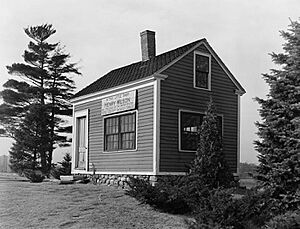
After looking for work in New Hampshire, Wilson walked over 100 miles to Natick, Massachusetts, in 1833. There, he learned how to make leather shoes called brogans. He quickly became skilled and opened his own shoe shop. He wanted to save money to study law.
Wilson was very successful as a shoemaker. He saved a lot of money in a short time. People called him the "Natick Cobbler" or the "Natick Shoemaker." These nicknames showed his humble beginnings as a working-class person.
While working, Wilson read a lot and joined a debating club. He became a good speaker. His health suffered from working long hours. He traveled to Virginia to get better. In Washington, D.C., he saw enslaved African American families being separated and sold. This made him decide to work to end slavery in America.
After getting better, he returned to New England and continued his education. He also started his own shoe manufacturing company. It was very successful and employed over 100 workers.
Early Political Career
Wilson became active in politics as a Whig. He supported William Henry Harrison in the 1840 election. He was elected to the Massachusetts House of Representatives and served from 1841 to 1842.
He also served in the Massachusetts State Senate from 1844 to 1846 and again from 1850 to 1852. From 1851 to 1852, he was the Senate's President.
Wilson became unhappy with the Whig Party because they tried to avoid the issue of slavery. He became a "Conscience Whig," meaning he was against slavery. He helped organize a meeting in Concord to oppose adding Texas to the U.S. because it would expand slavery. In 1845, Wilson and abolitionist John Greenleaf Whittier delivered a petition with 65,000 signatures against Texas annexation to Congress.
In 1848, Wilson left the Whig Party. They had nominated a slave owner for president and did not take a stand against slavery in new territories. Wilson then helped create the Free Soil Party. This party was formed to oppose the spread of slavery.
Wilson worked hard to bring together different anti-slavery groups. These included Free Soilers, anti-slavery Democrats, and even some members of the Liberty Party. In 1851, this group helped elect Charles Sumner, an anti-slavery candidate, to the U.S. Senate.
From 1848 to 1851, Wilson owned and edited the Boston Republican newspaper. It became the main newspaper for the Free Soil Party.
Wilson also served in the Massachusetts militia. He became a major in 1843 and later a colonel. In 1846, he was promoted to brigadier general. He held this rank until 1852.
U.S. Senator (1855–1873)
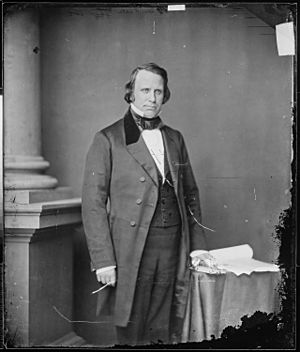
In 1855, Henry Wilson was elected to the United States Senate. He was chosen by a group of Free-Soilers, Know Nothings, and anti-slavery Democrats. He later joined the new Republican Party. He was reelected as a Republican in 1859, 1865, and 1871. He served in the Senate until March 3, 1873, when he became vice president.
In his first Senate speech in 1855, Wilson spoke out against slavery. He wanted to end slavery everywhere the U.S. government had control, including Washington, D.C. He also wanted to get rid of the Fugitive Slave Act of 1850. This law made the federal government help return escaped enslaved people.
Defending Anti-Slavery
On May 22, 1856, a pro-slavery Congressman named Preston Brooks brutally attacked Senator Charles Sumner on the Senate floor. Sumner was badly hurt. Wilson helped Sumner get medical help. Wilson called the attack "brutal, murderous, and cowardly." Brooks then challenged Wilson to a duel, but Wilson refused. He said he could not take part in a duel because of his beliefs and the law.
This attack on Sumner, along with other violent events, showed how tense the country was becoming over slavery. People were moving from just debating to using violence. This helped lead to the American Civil War.
Civil War Efforts
During the American Civil War, Wilson was the chairman of important military committees in the Senate. He worked closely with President Abraham Lincoln. He helped pass laws about soldiers, sailors, and supplying the growing Union Army and Navy.
In the summer of 1861, Wilson went back to Massachusetts. He recruited and equipped almost 2,300 men in 40 days. These men became the 22nd Massachusetts Volunteer Infantry. Wilson commanded them as a colonel for a short time.
His military experience helped him greatly in the Senate. He knew how to organize and supply troops. This made him very effective in helping the war effort.
Fighting for Equal Rights
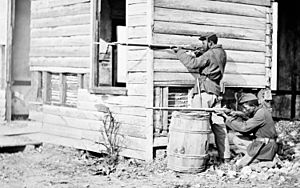
On December 16, 1861, Wilson introduced a bill to end slavery in Washington, D.C. He had wanted to do this for 25 years. This bill passed and President Lincoln signed it into law on April 16, 1862. This was a big step in the fight against slavery.
On July 8, 1862, Wilson wrote a law that allowed the President to enlist African Americans who had been enslaved. They could work on building forts and other military tasks. This was the first step toward allowing African Americans to serve as soldiers. President Lincoln signed this into law on July 17. However, African American soldiers were paid less than white soldiers.
On January 1, 1863, Lincoln's Emancipation Proclamation freed enslaved people in the Southern states that were fighting against the U.S. government. Congress then passed a bill allowing 150,000 African Americans to join the Union Army as uniformed soldiers.
Wilson also introduced a bill to fund elementary education for African American children in Washington, D.C. President Lincoln signed this into law on March 3, 1863.
In 1864, Wilson added a change to a law that said formerly enslaved African Americans who joined the Union Army would be permanently free. This meant they could not be re-enslaved. This law freed over 20,000 enslaved people in Kentucky alone.
Wilson strongly supported the right of black men to join the military. He also fought for them to receive equal pay and benefits. On June 15, 1864, Wilson succeeded in adding a rule to a bill that gave African American soldiers the same pay and benefits as white soldiers.
Wilson also introduced a bill to free the families of former slaves who were serving in the Union Army. He argued that it was wrong for soldiers' families to remain enslaved. President Lincoln signed this law on March 3, 1865. This freed an estimated 75,000 African American women and children.
Reconstruction and Civil Rights
After President Lincoln was assassinated in April 1865, Andrew Johnson became president. Wilson and other Republicans hoped Johnson would support their plans for Reconstruction. However, Johnson had his own plan, which was more forgiving to former Confederates and did not include full citizenship for African Americans.
Congress, which was controlled by Republicans, disagreed with Johnson. They refused to let Southern Senators and Representatives, many of whom were former Confederates, take their seats. Wilson believed that only people loyal to the U.S. should hold power in the South. He joined the Radical Republicans, who strongly opposed Johnson's policies.
On December 21, 1865, Wilson introduced a bill to protect the civil rights of African Americans. Although his bill did not pass, a similar one, the Civil Rights Act of 1866, passed over Johnson's veto in April 1866.
The conflict between Wilson and President Johnson grew. Johnson vetoed many Radical Republican laws aimed at protecting African American civil rights. Wilson supported the effort to impeach Johnson, saying Johnson was "unworthy" for resisting Congressional Reconstruction. Wilson voted to remove Johnson from office, but the vote failed by one.
Wilson also strongly supported allowing Arkansas to rejoin the Union. He argued that its new government was loyal and included African Americans. Arkansas was readmitted in June 1868. When Ulysses S. Grant became president in 1869, he supported Congressional Reconstruction. The remaining Southern states rejoined the Union during his first term.
In 1870, Hiram Rhodes Revels became the first African American elected to the U.S. Senate. Some Democrats tried to stop him from taking his seat. Wilson defended Revels's election. He argued that Revels's race should not prevent him from serving. The Senate voted to seat Revels, and Wilson personally walked him to his desk.
1872 Vice Presidential Campaign
By 1872, Henry Wilson was well-respected among Republicans. He was known as a principled reformer who supported civil rights for African Americans, voting rights for women, and federal education aid.
The current Vice President, Schuyler Colfax, said he would not run again. This opened the door for a new vice presidential candidate. Some Republicans wanted a new running mate for President Grant. They were concerned about corruption charges against Grant's administration.
The Republican convention met in Philadelphia in June. Grant was nominated for president again. Wilson was a popular choice for vice president. He had an inspiring "rags-to-riches" story, rising from an indentured servant to a successful businessman. He defeated Colfax for the nomination. Republicans believed Wilson's nomination would help counter the corruption arguments of the opposing Liberal Republican Party.
Campaign posters showed Grant as "the Galena Tanner" and Wilson as "the Natick Shoemaker." This highlighted their working-class backgrounds. In the general election, Grant and Wilson won by a large margin against their opponents, Horace Greeley and B. Gratz Brown. Wilson's nomination was seen as a success for the Republican ticket.
Vice Presidency (1873–1875)
Henry Wilson served as vice president from March 4, 1873, until his death. With his many years of Senate experience, he was a very effective leader of the Senate. During his time, he cast one tie-breaking vote. This vote helped pass the Civil Rights Act of 1875.
After Wilson's death, the vice president's office remained empty. At that time, there was no rule to fill a vice-presidential vacancy during a term. This rule was added much later, in 1967.
Illness and Death
Wilson was very busy with his duties and writing a book. This left him little time to rest. In May 1873, he suffered a stroke. It caused weakness and made it hard for him to speak. His health improved a little later that year. He returned to Washington and was able to lead the Senate for a few days in December 1873. However, he could not speak in public.
Wilson continued to have poor health in 1874. He attended the funeral of his friend Charles Sumner. When he felt better, he took part in some official events. This included a White House party for the King of Hawaii in December 1874.
In 1875, Wilson's health continued to decline. On November 10, 1875, he had another stroke while working at the United States Capitol. He seemed to get better for a few days. But on November 22, 1875, he suffered a fatal stroke at the Capitol.
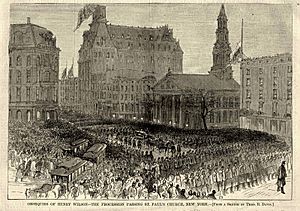
His body was honored by lying in state at the United States Capitol rotunda. His funeral procession traveled through several cities, including Baltimore, Philadelphia, New York City, and Boston. He was buried at Old Dell Park Cemetery in Natick, Massachusetts.
Henry Wilson was the fourth vice president to die in office.
Historical Reputation
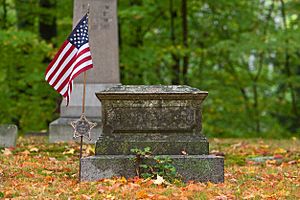
Henry Wilson served the public for nearly 30 years. He was known for supporting unpopular causes, even if it hurt his own career. He fought for the end of slavery and for the rights of all workers.
Wilson was not afraid to leave old political groups and form new ones to achieve his goals. While some called him "shifty," others admired his dedication to ending slavery. Working people found him inspiring because he rose from a poor background.
He supported free public schools and libraries. In Massachusetts, he helped remove property requirements for voting. This meant more people could vote, not just those who owned land.
Senator George Frisbie Hoar called Wilson "the most skilled political organizer in the country." Wilson was also known for finding out what people thought before he spoke his own views. This helped him build support and make political friends.
In 1891, a school for black students in Washington, D.C., was named the Henry Wilson school. This honored his role in freeing enslaved people in the district.
Personal Life
On October 28, 1840, Henry Wilson married Harriet Malvina Howe. They had one son, Henry Hamilton Wilson (1846–1866). Their son attended military school. During the Civil War, he left the United States Naval Academy to join the Union Army. He became a lieutenant colonel. He died in 1866 from a ruptured appendix. An Army post in Texas, Camp Wilson, was named after him. It was later renamed Fort Griffin.
Henry and Harriet Wilson also became the adoptive parents of a girl named Evangelina (Eva) around 1869. Eva lived with the Wilsons until shortly before Mrs. Wilson's death. After Henry Wilson died, his will asked that most of his money be used to care for his mother-in-law and to support Eva's education and finances. After some legal discussions, Eva received most of Wilson's estate.
Images for kids
-
After his 1862 resignation as Secretary of War, Simon Cameron praised Wilson's work aiding the War Department.
See also
 In Spanish: Henry Wilson para niños
In Spanish: Henry Wilson para niños
 | May Edward Chinn |
 | Rebecca Cole |
 | Alexa Canady |
 | Dorothy Lavinia Brown |


